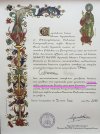Strictly speaking, as
@JGJ has already mentioned, his given name
Guy has no Latin roots.
Guy is apparently either derived or related to
Guido and both appear to be derived from the Old High German name
Wido which then has some older Germanic roots and meaning. No Latin involved.
Latin
Vido came onto the scene (most likely at least) sometime in the Middle Ages or later when it was fashionable to latinise European names, both given names and surnames. I was surprised to read that numerous Roman Catholic parish registers of birth, baptism, marriage and death were still written in ecclesiastical / church / neo / modern Latin until late in the 19th century where the parishers' real-life given names were latinised. There are books with lists of columns and columns of real-life name and Latinised name for those who are interested in deciphering such parish records.
Wikipedia's
Latinisation of names lists four methods of Latinisation:
- transforming the name into Latin sounds (e.g. Geber for Jabir), or
- adding Latinate suffixes to the end of a name (e.g. Meibomius for Meibom), or
- translating a name with a specific meaning into Latin (e.g. Venator for Italian Cacciatore; both mean 'hunter'), or
- choosing a new name based on some attribute of the person (e.g. Daniel Santbech became Noviomagus, possibly from the Latin name for the town of Nijmegen).
My guess is that in Guy's case it was the first method:
Guy/Guido/Wido and
Vido are homonyms, i.e. the words sound and look alike.
Needless to say, the actual Latin name is
Vido and not
Vidonem, just like say the actual Latinised name of
Martin is
Martinus and not
Martinum or for
Mary it is
Maria and not
Mariam.
Vidonem and
Martinum and
Mariam are merely grammatical forms in Latin that have no equivalent in English. These forms are on the Compostella because of the sentence that precedes them and the grammar rules of the Latin language that require these endings.






















